Нужно ли составлять Акционерное соглашение, или Устава будет достаточно для надлежащего управления компанией на Кипре? Как защитить права каждого из акционеров? Каковы последствия тупиковой ситуации (deadlock) и какие механизмы можно использовать для разрешения конфликта между акционерами?
Это только некоторые из вопросов, которые задают предприниматели при регистрации компании на Кипре, поиске партнеров и инвесторов, продаже существующих или приобретении новых акций, в ходе повседневной деятельности компании, а также в случае трудностей и конфликтов с другими акционерами.
В этой статье дадим общее представление о природе Акционерного соглашения и Устава кипрской компании, а также подробно рассмотрим основные темы, охватываемые Уставом и Акционерным соглашением, с целью сравнения важности, значения, и актуальности каждой из них.
Прежде всего, хотелось бы обозначить, что учредительный документ Кипрской компании состоит из Меморандума об ассоциации («Меморандум») и Устава («Устав»).
Цель Меморандума – сообщить общественности о целях компании и перечислить лиц, которые подписались на акции, в то время как Устав – это некий набор положений о внутренней организации юридического лица и системе управления им. Таким образом, возможно, Устав играет более важную роль в процессе менеджмента компании.
Акционерное соглашение не является учредительным документом компании и представляет собой некий договор между акционерами. Это соглашение о независимом членстве акционеров, обязывающее их соответствовать конкретным внутренним корпоративным процедурам.
Стандартный Устав обычно регулирует следующие вопросы и полномочия:
• Процесс назначения директоров и распределения управленческих полномочий совета директоров;
• Процесс проведения общих собраний (организация собраний и процесс голосования);
• Выплата дивидендов;
• Присвоение акций;
• Классовые права, закрепленные за разными типами акций;
• Порядок передачи акций;
• Процесс изменения уставного капитала;
• Полномочия и обязанности управляющего директора;
• Полномочия секретаря компании;
• Необходимость бухгалтерского учета и аудита;
• Положения о ликвидации.
Важно заметить, что любые положения Устава, не соответствующие положениям Закона о компаниях, будут считаться недействительными.
Если говорить об акционерном соглашении, нужно помнить, что это гибкий инструмент, который закрепляет договорные отношения между всеми или отдельными акционерами, или между компанией и ее акционерами – всеми или некоторыми из них.
Акционерное соглашение может включать вопросы внутреннего управления, такие как:
• Назначение и увольнение директоров определенными участниками, или предоставление акционерам права назначаться директорами;
• Механизмы разрешения споров, включая использование медиации или арбитража;
• Меры защиты миноритарных акционеров от решений мажоритарных акционеров, по вопросам, наносящим ущерб интересам миноритарных акционеров;
• Способы разрешения тупиковых ситуаций на общем собрании акционеров или на уровне совета директоров;
• Размывание полномочий директоров по принятию решений;
• Возможности введения новой коммерческой деятельности, которую будет осуществлять компания;
• Введение ограничений на продажу или передачу акций;
• Предоставление акционерам определенного контроля над управлением компанией, например, предоставление избранным держателям акций права назначать представителей в Совет директоров или накладывать вето на определенные решения или сделки;
• Ограничения относительно характера и деятельности компании;
• Обязательства в отношении объявления дивидендов;
• Положения, требующее единогласного или мажоритарного согласия акционеров с целью одобрения распространения деятельности компании на новые территории;
• Возложение на акционеров обязанности действовать добросовестно при осуществлении своего права голоса;
• Перечень так называемых «Зарезервированных вопросов» (“Reserved Matters”), которые предназначены исключительно для рассмотрения акционерами;
• Обязательство акционеров не заниматься какой-либо предпринимательской деятельностью, которая конкурирует с деятельностью компании (включая географические и/или временные ограничения).
Таким образом, кроме того, что Акционерное соглашение является очень гибким инструментом, оно может стать отличным механизмом для достижения консенсуса акционеров по обозначенным стратегиям.
В отличие от Устава, Акционерное соглашение не является публичным документом и предполагает гарантии для всех сторон, выходящие за рамки положений Устава. Также, что особенно важно, Акционерное соглашение помогает разрешить тупиковые ситуации и другие сложные вопросы.
Авторы книги Company Law Алан Дигнам и Джон Лоури говорят, что «если акционеры поместят в Устав положение, выходящее за рамки законодательства, оно, вероятно, будет недействительным. Однако, если они поместят то же самое положение в акционерное соглашение за пределами Устава, подписанное всеми или подавляющим большинством акционеров, то такое положение будет иметь силу».
Поэтому грамотно составленное Акционерное соглашение может стать полезным и гибким инструментом защиты интересов каждой из сторон.
EnergyIntel represents the new generation of companies that not only understand the need for sustainable energy solutions but also lead in their implementation. By offering energy solutions for residential and commercial buildings, as well as investing in large photovoltaic and solar thermal parks, the company is not just a key player in clean energy production but also a catalyst for Cyprus’ energy transition. Their clear path in renewable energy sources is complemented by solutions for electric vehicle charging stations, optimizing green charging consumption.The company has developed innovative standalone charging stations that can be deployed even in remote areas without electricity grids, ensuring a clean and fully aligned electric mobility supply.
It’s worth noting that EnergyIntel’s innovative thermal storage solution, ELECTRON247, received the highest rating in the last 20 years, specifically Category A - Excellent, during its final presentation to European technical assessors.
ELECTRON247 is a solar energy production and storage unit for which EnergyIntel received a €1,000,000 grant in 2020 as part of the Innovate/Restart 2016-2020 program by the National Calls for Innovation Proposals (IDEK). As part of the grant, they are closely monitoring and evaluating the project’s progress until its completion. Over the last 20 years since IDEK’s establishment in 1996, only 2 companies have managed to achieve the highest ratings from European assessors at this level.
EnergyIntel has evolved into a renewable energy technology company, aiming to establish solar energy not just as an alternative energy source but to totally replace energy coming from fossil fuels. Their Research and Development department is the heart of their innovation, with numerous patents (over 85) covering technologies ranging from innovative thermal storage materials to advanced energy conversion methods. The company continues to lead in entrepreneurial innovation, translating not only into significant technological advancements but also into creating economic value, thereby strengthening the competitiveness of the Cypriot economy.
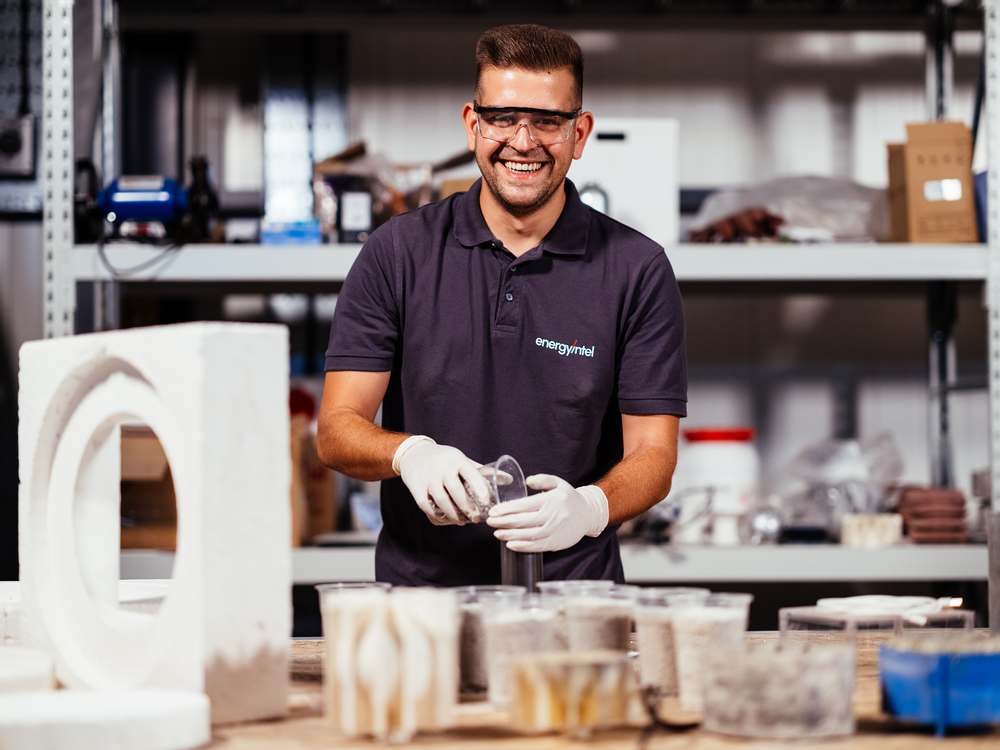
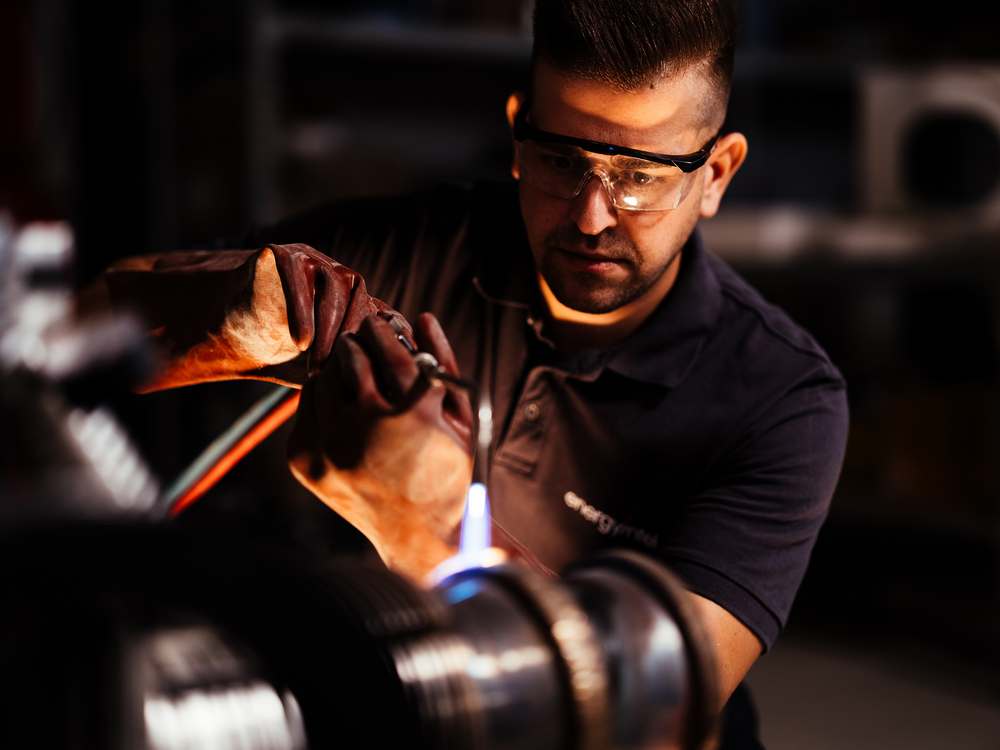

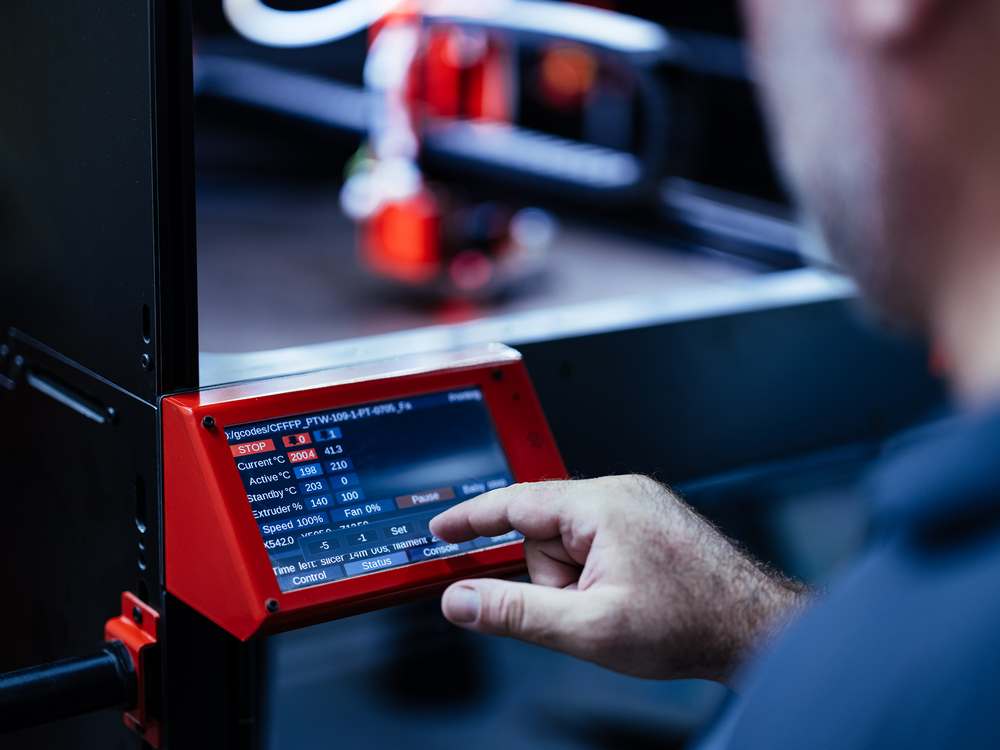
![]()
EnergyIntel Group
www.energyintel.com.cy
+357 22 380707
info@energyintel.com.cy
Freedom Finance Europe продолжает улучшать условия размещения свободных денежных средств на инвестиционной платформе Freedom24 ─ теперь проценты, которые компания выплачивает на свободный остаток в долларах США и евро, будут привязаны к плавающим ставкам SOFR и EURIBOR. Новые ставки более чем в полтора раза выше предыдущего предложения компании и составляют до 6,4% в евро и до 8,8% в долларах (на 12.01.24).
Обладатели накопительных D-счетов будут получать процент, равный плавающей ставке SOFR на размещения в долларах США и процент, эквивалентный ставке EURIBOR на размещения в евро. На 12 января ставки SOFR и EURIBOR составляли 5,31% и 3,884% соответственно. Ранее D-счет обеспечивал инвесторам доходность на уровне 3% годовых в долларах США и 2,5% в евро. Проценты начисляются ежедневно.
Доходность долгосрочных размещений также выросла и теперь достигает уровня в 1,5 раза выше ставок SOFR и EURIBOR для фиксированного срока в 12 месяцев. Для размещения средств сроком на 3 и 6 месяцев для расчета процентов к величине ставок SOFR и EURIBOR применяются коэффициенты 1,1 и 1,25 соответственно. Кроме этого, для долгосрочных размещений размером более 100 000 евро/долларов США выплачивается бонус от 0,4% до 0,8% годовых в зависимости от валюты и срока размещения. Так, на 12 января максимальная доходность долгосрочного накопительного плана Freedom24 с учетом бонусов составила 8,762% для долларов США и 6,409% для евро. Ранее инвесторы, выбиравшие этот инвестиционный инструмент, получали до 6,12% в долларах США и до 4,21% в евро.
Для обоих инструментов отсутствует ограничение на максимальный размер размещений, что выгодно отличает предложение Freedom24 от аналогичных продуктов на рынке. Минимальная сумма размещения средств для получения процентов составляет 150 долларов США/евро для D-счета и 1 000 долларов США/евро для долгосрочного накопительного плана.
Freedom Finance Europe также изменила размер комиссии за маржинальное кредитование — до 0,049315% в день в тарифе Smart (EUR/USD) и 0,041095% в остальных тарифах по сравнению с предыдущим размером комиссии 0,032877% в день.
Материалы предоставлены компанией Freedom Finance Europe.
Какие виды на жительство существуют на Кипре? Какие изменения прописаны в новом законодательстве? Как быстро можно получить гражданство Кипра? Об этом «Успешный бизнес» поговорил с управляющим партнером AG Advocates Анной Григорьевой.
Анна, какие существуют виды на жительство для иностранцев на Кипре? Можно ли оформить долговременный вид на жительство, или необходимо продлевать его ежегодно?
На Кипре существуют две категории виз: рабочие и без права на работу. Последние, в свою очередь, можно условно разделить на ПМЖ (постоянное место жительства) и ВНЖ (временный вид на жительство). ВНЖ требуется продлевать ежегодно. ПМЖ, в свою очередь, имеет неограниченный срок действия. Но при одном условии: нельзя отсутствовать на территории Кипра более двух лет. Если этот пункт нарушить, вид на жительство теряется.
Кто может получить ПМЖ без права на работу?
Есть две возможности. Требуется либо приобрести недвижимость на Кипре на сумму не менее 300 000 евро плюс НДС, либо купить менее дорогое жилье (или даже взять его в аренду), но при этом соответствовать определенным критериям финансовой состоятельности Основной категорией лиц, которые получают этот вид на жительство, являются люди пенсионного возраста. Ранее данный статус, который очень редко выдают молодым семьям, назывался категорией F.
Существует ли на Кипре Green Card?
Ранее действительно была такая категория виз. Она выдавалась лицам, которые работали в стране по трудовому договору. Через 5 лет у них появлялась возможность выбирать любого работодателя на Кипре без ограничений. В настоящее время для получения такого разрешения требуется дополнительно знать греческий язык на определенном уровне.
Какие виды рабочих виз существуют?
Рабочие визы и процесс их получения зависят от статуса компаний-работодателей. На острове действуют локальные компании, владельцами которых являются граждане Кипра либо иной страны Евросоюза, и международные компании, принадлежащие гражданам третьих стран на 50% и более
В чем же отличия? Локальным компаниям приходится доказывать, что иностранный работник для них незаменим. Это сложный, дорогостоящий и трудоемкий процесс.
Международным компаниям ничего обосновывать не нужно. Однако, процесс оформления виз для сотрудников все равно не быстр. Проблема в высокой загруженности миграционной службы. Визиты туда расписаны буквально на 6 месяцев вперед. Данная рабочая виза дает право работать лишь в одной компании, у одного конкретного работодателя. По данной визе недавно вышли новые положения
Имеет ли право владелец компании быть ее сотрудником?
Да, конечно. Владельца тоже можно оформить в штат. Кстати, интересный факт: лица, которые приобрели гражданство Кипра посредством натурализации, считаются гражданами третьих стран для целей регистрации компаний.
Что вы можете сказать о поправках к Закону о гражданстве, принятых в конце ноября этого года? Насколько они сделают Кипр привлекательным для высококвалифицированных специалистов? На каких основаниях вообще выдается гражданство?
Существует всего несколько оснований. Стать гражданином острова можно по праву рождения от киприота, на основании вступления в брак с гражданином Кипра или на основании законного проживания в стране не менее 7 лет. Поправки к Закону о гражданстве дают небольшое послабление для высококвалифицированных специалистов, необходимый срок проживания для которых снижен до 5, а в некоторых случаях и до 4 лет. При этом вышеуказанные специалисты должны соответствовать критериям, перечисленным в поправках. К примеру, знать греческий язык на определенном уровне.
Ранее можно было получить гражданство на основании крупных инвестиций в недвижимость или экономику страны. В настоящий момент данная программа полностью отменена, но, возможно, в будущем разработают другие проекты. Пока говорить об этом рано.
Какими качествами должен обладать кандидат, чтобы с наибольшей вероятностью получить положительный ответ от кипрского государства? Какие факторы влияют на принятие положительного решения?
Несмотря на то, что такого понятия в законодательстве не существует, заявитель должен доказать, что Кипр является центром его жизненных интересов. В международной практике под этим понимаются: наличие постоянного места жительства на Кипре, семья, которая тоже здесь живет, учеба детей в кипрских школах, работа в одной из локальных или международных компаний. У чиновников не должно возникнуть сомнений в том, что кандидат на гражданство планирует жить на острове долгие годы, работать, вносить вклад в экономику страны. Могут задаваться самые разнообразные вопросы, на которые придется ответить, чтобы подтвердить свои добрые намерения.
Правда ли, что сроки рассмотрения документов на гражданство непредсказуемы? Как можно контролировать этот процесс?
Первый год после подачи заявления волноваться нет необходимости. Но в дальнейшем стоит постоянно держать руку на пульсе. Я рекомендую записать номер своего дела и перепроверять его статус довольно регулярно, например, раз в полгода. Если в процессе выяснится, что какие-либо бумаги не были получены, то кандидат успеет вовремя их собрать и предоставить. Это вовсе не гарантирует успешный исход дела. Но таким образом можно быть уверенным, что пакет документов подан и находится на рассмотрении. В моей практике ни разу гражданство не получали быстрее, чем через год после подачи. Чаще люди ждут 2 или 3 года.
На Кипре в этой сфере практически ничего не поменялось за последние 25 лет. Система работала, работает, и будет работать. Она вполне демократична и справедлива по сравнению с тем, что происходит в других европейских странах. Самое главное – никогда не нарушать миграционное законодательство.
Анна Григорьева
Партнер – Управляющий директор,
Anna Grigorieva & Co. LLC
Анна имеет обширный опыт работы в корпоративных и коммерческих вопросах, в вопросах банкротства и реструктуризации, международном налоговом планировании, в вопросах иммиграции и недвижимости. Она была партнером авторитетной юридической фирмы на Кипре более 10 лет, прежде чем открыла собственную юридическую компанию в 2012 году. Анна является обладателем сертификата Кипрской комиссии по ценным бумагам и биржам и членом Единого государственного реестра (Public Registry) с 2020 года, а также членом Совета по инвестиционной миграции (IMC) и полноправным членом STEP.
What types of residency are available in Cyprus? What changes are outlined in the new legislation? How quickly can one obtain Cypriot citizenship? “Successful Business” discussed these topics with Anna Grigorieva, the Managing Partner of AG Advocates. She offers invaluable advice on navigating the system, emphasising the importance of demonstrating a commitment to life in Cyprus and providing practical tips for effectively monitoring the citizenship application process.
Anna, what types of residency are available for foreigners in Cyprus? Is it possible to obtain permanent residency, or does it need to be renewed annually?
In Cyprus, there are two categories of visas: those for work and those without the right to work. The latter can be conditionally divided into PR (Permanent Residency) and TR (Temporary Residency). TR needs to be renewed annually. PR, on the other hand, is valid indefinitely. However, there is one condition: one must not be absent from Cyprus for more than two years. Violating this rule results in the loss of residency.
Who can obtain PR without the right to work?
There are two possibilities. One must either purchase property in Cyprus for no less than 300,000 euros plus VAT or buy a less expensive house (or even rent it) but meet certain financial solvency criteria. The main category of people who receive this type of residence are pension-age individuals. Previously, this status, rarely granted to young families, was known as category F.
Is there still a Green Card in Cyprus?
There used to be such a visa category. It was issued to individuals working in the country under an employment contract. After 5 years, they had the opportunity to choose any employer in Cyprus without restrictions. Currently, obtaining such a permit additionally requires knowing Greek at a certain level.
What types of work visas exist?
Work visas and their acquisition process depend on the status of employer companies. There are local companies owned by citizens of Cyprus or another EU country, and international companies owned 50% or more by third-country nationals.
What are the differences? Local companies must prove that a foreign worker is irreplaceable for them. This is a complicated, costly, and labor-intensive process.
International companies do not need to justify anything. However, the visa processing for employees is still not fast. The problem lies in the high workload of the immigration service. Visits there are booked literally six months in advance. This work visa also grants the right to work only in one company, for one specific employer. New provisions for this visa were recently introduced.
Does a company owner have the right to be its employee?
Yes, of course. The owner can also be registered as staff. Interestingly, individuals who have acquired Cypriot citizenship through naturalisation are considered third-country nationals for company registration purposes.
What can you say about the amendments to the Citizenship Law passed at the end of this year? How attractive will they make Cyprus for highly qualified professionals? On what grounds is citizenship generally granted?
There are only a few options. One can become a citizen of the island by right of birth from a Cypriot, by marrying a Cypriot citizen, or by legally residing in the country for at least 7 years. The amendments to the Citizenship Law offer slight relief for highly qualified professionals, reducing the required residency period to 5 years, and in some cases even to 4 years. However, these professionals must meet criteria listed in the amendments, such as knowing Greek at a certain level.
Previously, citizenship could be obtained based on large investments in real estate or the country’s economy. Currently, this program is completely cancelled, but other projects might be developed in the future. It is too early to talk about this now.
What qualities must a candidate possess to most likely receive a positive response from the Cypriot state? What factors influence the decision-making process?
Although not explicitly mentioned in the legislation, an applicant must prove that Cyprus is the centre of their life interests. Internationally, this includes having a permanent residence in Cyprus, a family living there too, children attending Cypriot schools, and working in one of the local or international companies. Officials must have no doubt that the citizenship candidate plans to live on the island for many years, work, and contribute to the country’s economy. A variety of questions may be asked to confirm the applicant’s good intentions.
Is it true that the timelines for processing citizenship documents are unpredictable? How can one monitor this process?
There’s no need to worry in the first year after application submission. However, it’s important to stay on top of it afterwards. I recommend noting your case number and regularly checking its status, for example, every six months. If it turns out that some documents were not received, the applicant will have time to gather and submit them. This doesn’t guarantee a successful outcome, but it ensures that the document package has been submitted and is under review. In my practice, citizenship has never been granted faster than a year after submission. People often wait 2 or 3 years.
In Cyprus, almost nothing has changed in this field for the last 25 years. The system worked, is working, and will continue to work. It is quite democratic and fair compared to what happens in other European countries. The most important thing is never to violate immigration law.
Anna Grigorieva
Partner – Managing Director,
Anna Grigorieva & Co. LLC
Anna has extensive experience of corporate and commercial matters, insolvency and restructurings, international tax planning, immigration and real estate. She was a partner at a reputable law firm in Cyprus for more than 10 years prior to setting up her own law firm in 2012. Anna is a holder of the Advanced Examination by Cyprus Securities and Exchange Commission and a Member of the Public Registry since 2020, she is also a member of the Investment Migration Council (IMC) and a full member of STEP.
If you were to ask family office investment professionals to describe the markets in 2023 in one word, many would probably choose “confusing”. It hasn’t been as outright bad as 2022, but it has hardly been enjoyable. Bonds are down again, while almost all equity gains are due to virtually a handful of “big tech” US stocks. Anyway, stocks are up while bonds are down: The US economy must be doing great, right? Well, surprise: it is on the brink of “the most anticipated recession ever”!
The positive stock-bond correlation has vast implications for portfolios. Unlike the previous 30 years, the fixed income part of the portfolio does not currently fulfill its role as a portfolio diversifier and stabilizer. Moreover, the most widespread alternative diversifier, real estate, also looks problematic. Will the confusion come to an end in 2024?
BONDS FOR 2024 BEST ASSET CLASS
We cannot imagine a world where bonds finish 2024 with returns below 7%+. Our reasoning goes as follows:
1) Major central banks are about to stop hiking interest rates (with Japan being an exception). It means that prices of sovereign bonds, such as US Treasuries, will stop falling. The US election year may give the Fed additional incentives to turn “dovish”.
2) Bonds are once again yielding more than inflation.
It means investors receive decent compensation for inflation risk.
3) Still a decent probability of a US recession in 2024. In this scenario, credit spreads widen by 200-300 bps and corporate bonds will be at extremely attractive levels. Our LEON Income Fund RAIF will be able to lock in a 12% yield in high-yield corporate bonds.


ARBITRAGE HEDGE FUNDS FOR 2024 BEST DIVERSIFIER
What asset class can be a risk diversifier besides bonds? We firmly believe that uncorrelated hedge funds should be a core part of the Alternatives allocation of any well-constructed portfolio now. The LEON Global Hedge Fund RAIF is aiming to offer just that allocation prepackaged and ready for inclusion in any equity portfolio. Studies show that adding uncorrelated, high-return, high-risk components to a portfolio improves returns while maintaining the same amount of risk taken. This is particularly true when there is no clear trend in equity markets, which we believe will be the case in 2024.
 |
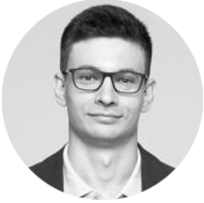 |
| Michael Borisov, CFA Portfolio Manager, Alternative Investments |
Artem Kalinin, CFA |
LEON MFO Investments
Tel.: +357 25 268 120
e-mail: marketing@leonmfo.com
Address: 37, Theklas Lisioti,
Gemini House, Office 301,
CY-3030, Limassol, Cyprus
www.leoninvestments.com.cy
Freedom Finance Europe announces another step in its growth trajectory with the inauguration of 3 new offices in the Netherlands, Austria, and Bulgaria, reflecting the company's commitment to deliver advanced investment solutions to diverse European markets. Following the official launch of Freedom24, Freedom Finance Europe’s investment platform across the EU in 2021, the company has already opened 6 representative offices over this year.
The new office in Amsterdam will focus on developing the Dutch market and serve as the Benelux hub, a region where the company has seen a 162% client growth over the past 12 months.
"We find ourselves in a pivotal phase of growth for Freedom Finance Europe," said Nathan Civile, Head of Representative Office in the Netherlands. "As we navigate this development, our primary objective is to expand our footprint in strategic markets. The Netherlands holds a unique and integral position in our long-term strategy, and the much-anticipated establishment of our Amsterdam office marks a significant step in our efforts to solidify Freedom Finance Europe's enduring presence across the entire Benelux region. I am glad to use my knowledge and experience towards bringing an extensive range of financial products, services, and technologies to an ever-growing client base in the Netherlands and beyond."
The decision to open a branch in Austria is followed by solid growth numbers, with Freedom Finance Europe’s client base seeing a 164% increase just over the last year.
“I am pleased to share our strategic move into the Austrian market," stated Shanna Strauss-Frank, Freedom Finance Europe's spokesperson for the DACH region. “With the opening of our new office in Vienna, we are eager to further intensify our client-centric approach. By tailoring our expertise to meet the unique financial needs of the Austrian market, we aim to strengthen our position as a trusted financial partner in the country."
In this strategic expansion initiative, the Bulgarian representative office is set to reinforce the company’s presence in Southeast Europe.
“I am pleased that Freedom Finance Europe has decided to establish a representative office in Sofia. As we extend our reach to Bulgaria, our goal is to provide our current and prospective clients with transparent, value-focused solutions, showcasing the depth of the company’s mission to make investments available to a broader range of retail clients", said Alexandr Buyukli, Head of Representative Office in Bulgaria.
The new offices signify a step forward in the company's mission to enhance accessibility for investors and establish itself as a trusted financial partner across the European markets. Freedom Finance Europe, which currently operates in 10 EU countries, is committed to further strengthen its market foothold in 2024 by opening representative offices in other international destinations seen as promising for the company’s long-term growth.
Materials are presented by Freedom Finance Europe.
Evgeniy Tyapkin, Executive Director of Freedom Finance Europe, discusses the development of the financial sector in Cyprus over the past 10 years and shares his thoughts on what to expect in 2024.
Where did it all start?
I’ve been in Cyprus since 2014, initially leading another brokerage firm, and joined Freedom Finance in 2017. At that time, we were essentially a start-up – just 8-10 people in an office set in a villa. We were learning to work in a completely new country and a new European jurisdiction, trying to meet all the local requirements. On one hand, we were focused on training and compliance. On the other hand, we always had a robust IT team, which, alongside operational activities, created and developed a trading platform, still in use today.
Did you initially plan to develop and maintain the platform yourselves?
Absolutely. We had the expertise for both. Now, we operate two companies. We attract and serve clients through Freedom Finance Europe. And there is Freedom Finance Technologies, which focuses on the development and support of our trading platform, used not just by our group’s companies but also by other professional market participants, including those in Cyprus.
Over these years, there have been both highs and lows. In the Cypriot economy and in the government’s relations with various types of business. How has the attitude of the Cypriot regulator towards your business changed?
It can be asserted that Cyprus is now one of the most regulated jurisdictions among European countries. In an effort to shed its offshore reputation, Cyprus has introduced very serious regulatory measures since 2014. However, as we grew gradually, we consistently integrated these measures into our operations without much stress.
If you were to describe the activity of Freedom Finance Europe in Europe in one sentence, how would it sound?
Freedom Finance Europe is a brokerage firm that provides direct access to international stock markets, where any client can quickly purchase real shares and other securities.
A significant advantage of your company is that you have reached a wide retail market. So, any person, regardless of the amount they have, be it 1,000 or 100,000 euro, can use your platform and trade shares?
You are absolutely right. There are minimal lots on the exchange, but they are usually insignificant, allowing us to execute client orders for almost any amount.
How did you come to this approach?
At the start, we had two main tasks. The first was to create a technological platform, and the second was to establish the corresponding infrastructure. Unlike many companies that do not route client orders to the stock market, we need to have relationships with clearing agents, depositories, exchanges, and prime brokers. For example, we have direct membership on the Athens Stock Exchange, and orders are executed through the Greek bank Piraeus, where clearing and delivery of securities also occur. All this must also comply with legislative requirements, which are constantly becoming stricter.
What is your abmition when it comes to the market share in Europe?
We are just beginning our active growth phase. Our marketing has gained sufficient strength, and our client base is expanding. However, our overal share across Europe is still modest. It is worth mentioning that our clients, which now amount to around 400,000, are serviced by a relatively small team: our platform is designed so intuitively that clients can easily understand everything on their own. Therefore, we won’t have issues with scaling.
Similarly, we won’t have problems complying with legislative norms and rules. We report to more than one regulator and more than once a year. Our primary regulator is the Cyprus Securities and Exchange Commission. We also report to the U.S. Securities and Exchange Commission, where reports are required quarterly.
Additionally, we work with auditors from the “Big Four”, who are also PCAOB-certified. These specialists are authorized to work with public companies.
Are you a public company?
Yes, for four years now. Shares of our holding are traded on the Nasdaq Exchange. It’s important to note that the reporting of a public company is much stricter than that of a private one.
However, your reputation was negatively impacted by a few publications from an American company…
Indeed, there are certain ill-intented practices when fake information is fabricated and delivered in the form of research. When published, the authors count on the market reaction and take short positions in the targeted company. After the research is published and the stock price drops, the position is closed, and money is made that way.
It’s quite common in the U.S. to play the stock market not for a rise, but for a fall. We have responded and dismantled all of the accusations publicly, making it clear that this was a fabricated attack. To be fair, we don’t see a significant impact of these publications on the value of our shares. There was some decline, but then the value returned to approximately the same level as before the publications.
What about the reputational hit?
As of now, we are not facing any difficulties. None of our partners have broken off relations with us. We have always conducted business openly with both counterparts and clients. This was our principle even before we became a public company, and we continue to strictly adhere to it. We inform, warn, explain… Even when we make a mistake, we always talk about it.
I can assume that because of this situation, some might have chosen not to partner with us, but all those who were with us earlier have stayed. Importantly, in our experience, the larger the participant and counterpart we cooperate with, the fewer questions they have.
How challenging is it to work here, in Cyprus, considering the situation with Cypriot banks?
Cypriot banks prefer to do nothing, to refuse everyone, to prohibit everything, just to avoid taking responsibility. But sooner or later, they will have to move out of this state, or they will remain on the sidelines of business. Staying in such a state for a long time is not sustainable as competition doesn’t stand still. Neobanks, which also operate within the law without violating any requirements or rules, are already posing serious competition to traditional banks, and this trend is only going to intensify.
Can you predict the main events of 2024 in various sectors? Let’s start with the regulator. What changes do you foresee here?
I believe the regulator has reached its optimal level in terms of performing its functions, and it will only improve the processes that already exist. For instance, the quality of reporting, which we are already seeing improve.
What about the securities market?
I don’t anticipate any significant changes in the near future. Over the past few years, all companies in this market have achieved an optimal level of compliance with current regulatory requirements. Sanctions do add some complexities, but they are not something that can seriously affect the market. Everyone has learned to operate in these circumstances.
In terms of market dynamics, it’s hard to expect significant growth under current conditions. However, the market never stands still; it’s always moving. This means there are opportunities for profit in trading.
And finally, what’s your forecast for the development of Cyprus? What direction will it take?
Cyprus is a unique place. It has always been fortunate. Just look at the island’s history. Initially, it was an offshore zone, providing the state with earning opportunities. Then, when Cyprus joined the EU, those opportunities disappeared, but new ones emerged, like the IP-Box tax regime. This brought in a lot of talent, a surge in intellectual property creation, and the opportunity to earn royalties. The real estate sector began to grow, along with investment opportunities and residency options... What did this lead to? An influx of investment and funds into the economy, the development of the construction sector and development companies, an increase in demand for labor, and much more. Most likely, this trend will continue in the future, meaning the economy will grow.
What is Cyprus lacking?
Undoubtedly, Cyprus needs digitalisation, e-government, and advanced fintech services. We’ve already started meetings to discuss how we can emulate experience that we’ve accumulated in Kazakhstan, where our holding is among country’s key financial institutions, advancing banking, insurance, brokerage, and e-com businesses in close collaboration with the state’s digital infrastructure. For instance, in Cyprus, it took me 2.5 months to process a mortgage, while in Kazakhstan, it’s done in an hour. Their databases are so well digitized that most official matters are resolved in just minutes.
I would like Cyprus to also become a developed digital country. Of course, this is a challenging and slow task. There isn’t a country in Europe where this issue is fully resolved yet. But that doesn’t mean we shouldn’t move in that direction. And we are ready to help. We have a large team with very serious, long-term experience. We were the first company in Kazakhstan to launch digital credits. Now we even have digital auto loans there. We are ready to share our expertise to create a high-level digital government in Cyprus.
With a grand celebration spanning an entire week in December, Limassol-based Exness marked its 15-year anniversary. This occasion, titled ‘15 Years of Exceptional Moments’, wasn’t just a celebration of Exness’ achievements and its rise as a greatly prominent global retail broker; it was a tribute to the people who were instrumental in its journey – employees, clients, and partners.
In a grand gesture of appreciation and recognition, Exness flew almost one thousand people who are integral to its success, to Cyprus. The week was packed with extraordinary events, featuring a blend of gala and corporate dinners, island tours, and lively parties.
Attending the events were also prominent figures of Cyprus’ political and social scene. The Minister of Tourism, Kostas Koumis, took the stage at one of the week’s many events, held at Limassol’s City of Dreams, delivering a commendatory speech, acknowledging Exness’ business achievements and thanking the company for what he characterised as one of the biggest events of the past few years.
Central to the celebrations was a series of talks by Exness’ senior managers on the “Future of Exness”. These unveiled Exness’ strategic vision, brand evolution, plans for partnerships, and role in the capital markets. During these talks, Exness’ guests had an exclusive preview of a major announcement coming at the end of January 2024.
These talks showcased that while Exness has an ambitious vision for the future, it remains true to its founding values of innovation and ethical practices. Exness’ commitment to these values is evident in its entire approach to product development. The company, specializing in facilitating access to the financial markets, leverages technology and data science to constantly improve the trading experience for its clients.
But the highlight of the celebration was the climactic Cyberness Party, an unprecedented event for Cyprus, showcasing a stunning display of retro-futurism, and offering attendees an immersive entertainment experience. Taking place at Limassol’s revamped Kolla Factory, the party combined spectacular culinary, musical, and visual experiences, symbolic of the company’s products and milestones. With creativity and innovation at its core, the event was reflective of Exness’ character and ethos. Incredible musical and dance performances were given by international stars Who Made Who, Satori, Alma Linda, Playtronica, Curiosity Media Lab, and Context. Diana Vishneva. The party was also attended by key Cypriot socialites and influencers.
Exness CEO, Petr Valov, commented: “Hosting this celebration in Cyprus and bringing together our partners, clients and key contributors to our success was tremendously moving and surreal. Our anniversary was a great opportunity to come together, celebrate our collective achievements, and share our vision for the future, all on this beautiful island we now call home. We are ready to embark on the next 15 years and a new exciting era for both Exness and Cyprus.”
The blend of technological advancements and ethical practices Exness employs, has propelled the company’s expansion in over 100 countries and its growth from monthly trading volumes of $10 billion in 2010 to nearly $5 trillion in 2023. Its global footprint is supported by a workforce of more than 2000 world-class employees and a network of 119,000 dynamic partners and 600,000 clients worldwide.
Beyond its reputation as a top employer in Cyprus, Exness significantly contributes to Cyprus’ community. The company’s corporate social responsibility focuses on education, the environment, and emergencies. Notable initiatives of the past years include the €1,000,000 donation for COVID relief efforts, a €600,000 contribution to the Department of Forests in Cyprus, and full Cambridge scholarships to top students in science and tech-related fields. As a founding member of Tech Island, Exness is also instrumental in transforming Cyprus into a Mediterranean tech hub, strengthening the competitive advantage of the local economy and workforce.
The 15-year milestone was an exceptional moment for everyone involved in Exness’ success to celebrate and look forward to the future. The celebrations were not just about commemorating past achievements but also about setting the stage for Exness’ future steps. As Exness is poised to enter a new era, it is committed to remaining true to the same principles of tech-driven product development and ethical practices that have been instrumental in its rise to becoming an incredibly prominent global broker.
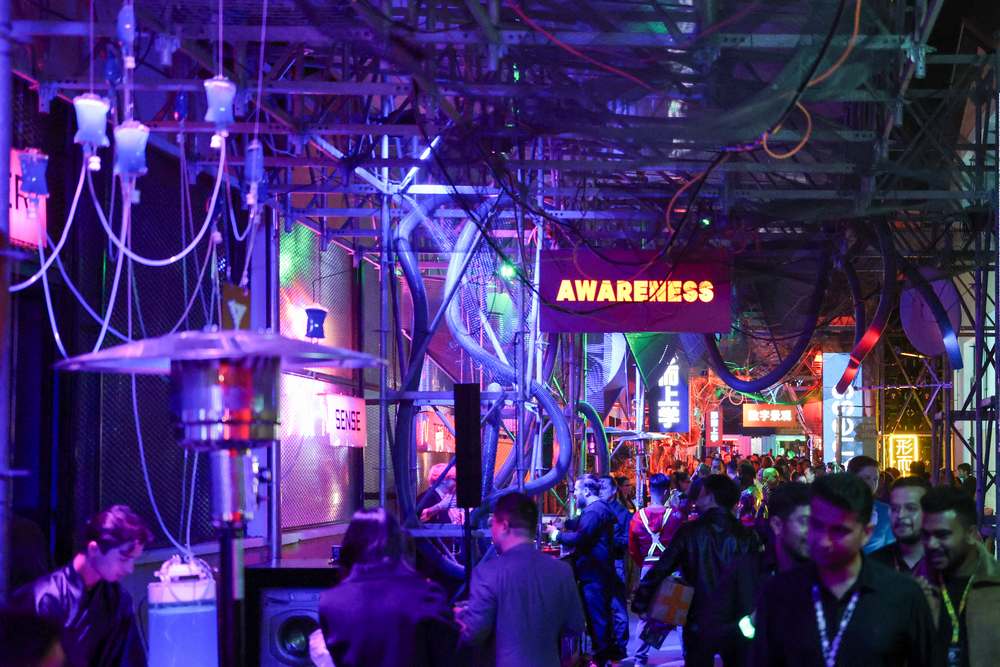



The global conflicts of 2022-2023 have shaken all countries, including Cyprus. Price fluctuations, rapid migration, and total uncertainty have been a test of strength for all businesses. Demos Mouskis told “Successful Business Magazine” about how the only aluminium plant in Cyprus operates, how his company and the island’s economy are living through the crises, and what prospects he sees for the next year.
How was 2023 for the construction industry?
It can confidently be said that the year was successful. This is evident in our cities. Limassol is developing at a rapid pace. Nicosia and Paphos are also being actively built up, especially Larnaca, which will continue to develop rapidly in the next 2-3 years.
How have global challenges faced by the World impacted the manufacturing sector?
I can speak from the perspective of the aluminium industry, where I work. We’ve never seen such an incredible increase in prices as in 2022. This was a serious problem, especially considering that aluminium production is very energy-intensive. Fortunately, during 2023, prices stabilised and almost returned to their previous levels. The new norm is a bit higher than before, mainly due to electricity prices, but it can’t be called critical anymore.
As far as I know, Cyprus has always been one of the most expensive countries in the world in terms of electricity costs. Compared to other European countries, our electricity was 4-8 times more expensive. At our production facility, we cover 40% of our needs through a photovoltaic park in which we’ve invested significantly. It provides us with 2.5 megawatts, allowing us to maintain our product prices at a very reasonable level.
How competitive is Cyprus in terms of aluminium products?
In Cyprus, we are known as manufacturers of aluminium products for the construction industry. There are simply no other consumers of our products on the island. There’s no automotive industry, shipyards, or airplane manufacturers. But in other countries we’re not limited to just aluminium profiles for construction. We serve all kinds of industries worldwide.
Our factory is considered state-of-the-art in terms of technology, machinery, and of course our knowledge of aluminium. Our production capacity exceeds by 3 times the entire possible demand of the Cyprus market, so exports have always been essential to our development.
Here in Cyprus, we offer 50-60 different systems for the construction industry. The choice for consumers is vast. To explain to your readers, an aluminium system is a set of various forms of aluminium from which a specific product is created. For example, imagine a sliding window. Each rail in it – top, bottom, side... – is part of the system. Additionally, the block into which the glass is fitted, as well as accessories – all together constitute the system of a specific type of sliding window.
Such a window might have 10 different profiles. Altogether, MUSKITA holds thousands of industrial drawings, copyrights and patents, and produces around 6,500 items, which are sold in 55 standard colours. Moreover, we proudly received several innovation awards and industrial recognitions for products such as THÉA, interior partitions, facades, as well as for energy conservation and solar power production.
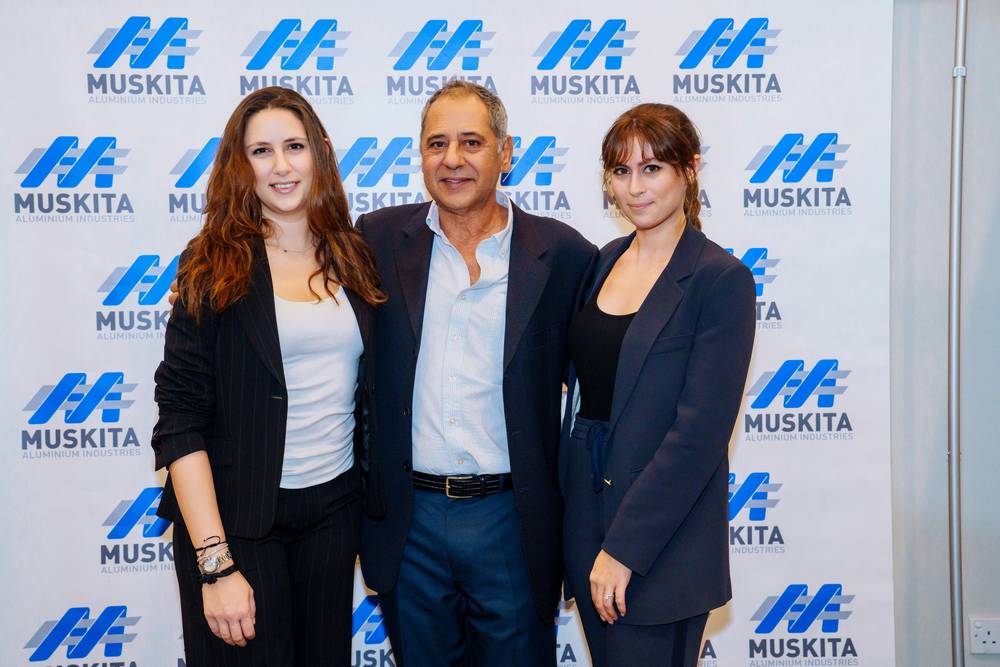
Demos Mouskis with daughters Emily and Anna Mouskis. Photo: Successful Business
How are logistics managed with such a wide range of products?
We can produce and deliver any combination of products to the customer within 10 working days, if it is in stock. Usually, 50% of our items are in stock. If something is not available, we can produce the required items and deliver them to the customer within a maximum of two working weeks.
I believe this is our competitive advantage, which keeps us successful at all times, in addition to the high quality of our products that meet European standards. We supply to Germany, the Netherlands, England, and Ireland. The production technology we use can easily compete with European manufacturers in all parameters, including price. We have the perfect combination of quality, price, and service.
Are the systems intended for Cyprus different from those for other countries?
Certainly. The climatic conditions on the island are not the same as, for example, in Germany or the United Kingdom. We develop systems that take into account the nuances of construction in Cyprus and are designed to function for a very long time without any problems.
For clarity, let me explain with an example. During 24 hours, the temperature in Cyprus can fluctuate with a very large delta. During the day, we have strong sun, and all surfaces, especially metal ones, heat up a lot (up to +55-90 degrees Celsius). At night, the temperature drops to +20-25 degrees Celsius. Thus, the temperature delta on the surface of a window block can be up to 70 degrees Celsius. In other countries, such significant temperature fluctuations are almost never observed, so the load on components and their wear differ significantly. That’s why, when developing systems for different markets, we take into account local climate features.
For example, in Mauritius, we are market leaders. The island is located in the Indian Ocean and often experiences cyclones. When calculating and supplying materials for this market, we take into account the need for the structure to withstand wind speeds of up to 300 km/h. This is critically important, as one or two cyclones occur annually in Mauritius with extreme rainfall and extreme wind load.
Our company has accumulated all this knowledge over the years. Now we can adapt our systems faster and more efficiently than our competitors to any local climatic conditions.
Where do you purchase raw materials for production, and in what form are they supplied?
We mainly buy metal from the UAE, where the quality of materials is exceptional. Usually, aluminium comes to us in the form of a solid cylinder similar to an electric pole.
In production, we use primary metal in various alloys and then heat it for processing. The alloys differ, affecting the hardness of the aluminium. For example, one alloy is used for producing car components, and a completely different one for producing structural components for shipyards.
Am I correct in understanding that you don’t melt but heat the metal?
Absolutely right. We heat it. This process is called extrusion. Then we push and force it through a die to create various shapes. As I mentioned, we have about 6,500 such shapes. In principle, we can create absolutely any shape you can imagine. It’s both a curse and a blessing.
Why?
Because on the one hand, we have an unlimited horizon of possibilities. On the other hand, we constantly think about what other shape we can come up with. Sometimes, I even wake up in the middle of the night thinking about a new idea. They seem to come out of nowhere. But then, when they come to life, you realise that anything is possible.
Do you work in any way with those who install your systems?
Naturally, we train specialists who assemble our systems. Additionally, we have teams of technicians who ensure the specifications are met.
Keep in mind, that the fabricators who will cut, assemble and install MUSKITA systems, are the exact same people who also fabricate and install any other companies’ systems, whether these are “German”, “Greek” or “Cypriot”.
What sets us apart is our adaptability and most importantly the fact that everything needed to add, adapt or to accommodate an architects’ special request is produced in house by us at our facilities in Cyprus. Anyone can come to us and see how we work, get advice. We plan to continue developing on the island and are ready to produce everything necessary for Cypriot buildings, both now and in the future.
Due to conflicts, many people are arriving in Cyprus, new buildings are needed…
A lot was built in 2023. Despite various scandals related to visas and golden passports, it pleases me that Cyprus has created its infrastructure. In Limassol, a self-sustaining economy has formed. The island has enough local business and local activity to increase and secure its economic stability.
Regarding the population increase, especially in Limassol: this city has historically welcomed new cultures and people and gradually blended them. This area has been a place of cultural and civilization mix, exchanging ideas and experiences since ancient times. The situation in 2022-2023 has, of course, affected both real estate prices and the amount of available housing. But, in any case, every city always has areas with more expensive and cheaper real estate. Limassol is developing, expanding its borders, and I think the trend to expand northwards – up the hills – will continue. We already see that schools and hospitals are being built in that area and the infrastructure is improving. In my opinion, this trend will continue. It’s the normal evolution of a modern city.
What do you expect in 2024 in the industrial sector?
I think the impact of geopolitical conflicts will continue, on the whole world, including Cyprus. We are in a relatively safe place, even despite the Cyprus problem, so I assume that the flow of people and businesses to the island will increase, from Russia and Ukraine, as well as from Israel. In my opinion, our main task in this regard for next year is to keep Cyprus as a safe and pleasant place to live and do business.
On the positive side, there are many new projects and new products in development.
Since our business projects are always long-term, I can already forecast the demand for the next 12 months, and in some areas even for 2025. Therefore, unless there are even bigger force majeure events in the World, I am confident that 2024-2025 will be years of new opportunities for our company and – in general – for the Cypriot industry and construction.
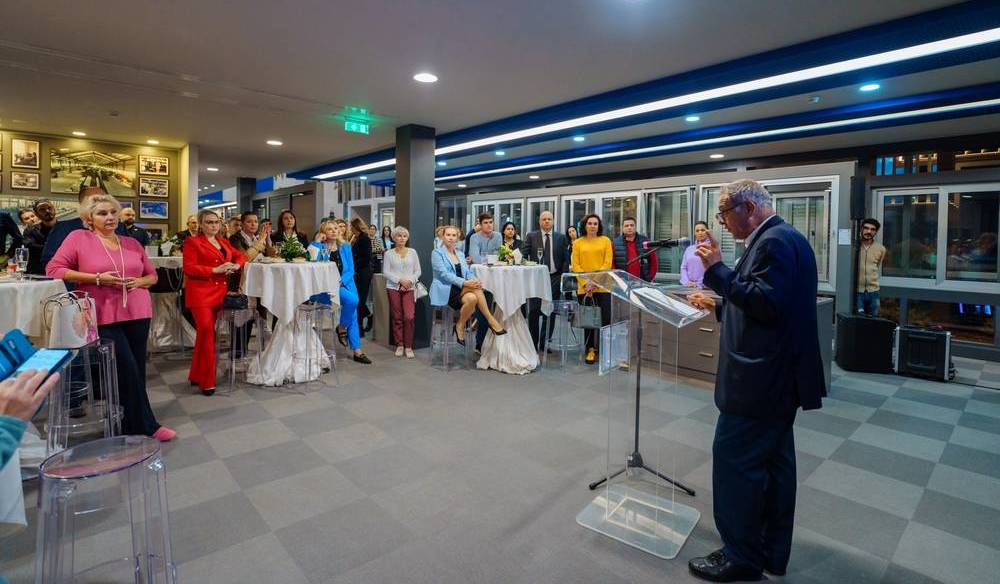
Foreign architects and interior designers along with SBL Club members had a tour around Muskita plant. Photo: Successful Business